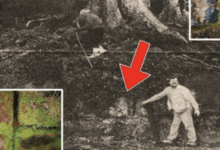Hidden Teachings of Jesus Banned from The Bible Reveal Shocking Secrets of Humanity
The Forgotten Truth: The Mystical Teachings of Jesus and the Political Battle That Shaped the Bible
Before Christianity became a formal religion bound by doctrine, rituals, and hierarchy, it began as a dynamic spiritual movement — one that emphasized direct experience of the Divine. But much of Jesus’ most profound, mystical teachings were systematically erased from the Bible we know today. Why?
The so-called lost gospels — including the Gospel of Thomas, the Gospel of Mary, and the Gospel of Philip — reveal a very different image of Jesus. Far from the miracle-working savior demanding worship, he emerges as a spiritual master guiding followers toward inner transformation, divine self-awareness, and enlightenment. These texts describe salvation not as a reward for belief in the crucifixion, but as a personal awakening to the divine spark within.
In the Gospel of Thomas, Jesus teaches, “The Kingdom is inside of you, and it is outside of you.” He urges seekers to go beyond the material world — to “fast from the world” — and discover truth through self-knowledge. This mirrors meditative practices found in Eastern philosophies like Buddhism and Taoism.
The Gospel of Mary presents a soul’s journey through spiritual obstacles such as desire, ignorance, and wrath — stages that echo the psychological development of the self in Jungian thought. Mary Magdalene is not portrayed as a mere follower, but as Jesus’ closest confidante, receiving secret teachings and displaying spiritual insight that surpasses the male disciples. Her role challenges the deeply patriarchal structure of the early church.
Meanwhile, the Gospel of Philip uses the symbol of the “bridal chamber” — not as a literal sexual union, but as a metaphor for the sacred merging of masculine and feminine energies within. This reflects a mystical path to wholeness and union with the divine.
These teachings were seen as threatening by the early church, especially after Emperor Constantine adopted Christianity as the state religion in the 4th century. The institutional church needed a unified doctrine to solidify its power and control. Teachings that emphasized personal spiritual authority undermined the role of clergy and hierarchy. Councils like Nicaea (325 CE) declared alternative texts heretical, and many were banned or destroyed.
Despite this suppression, a treasure trove of these lost writings resurfaced in 1945 with the discovery of the Nag Hammadi Library in Egypt. This collection included dozens of early Christian texts long thought lost — revealing a more diverse and mystical Christianity than previously imagined.
Even more remarkable, many of the ideas found in these gospels align with modern scientific and psychological discoveries:
-
Neuroscience confirms that practices like meditation — central to many Gnostic teachings — can reshape the brain, enhance awareness, and increase inner peace.
-
Jungian psychology supports the idea that knowing and integrating the self leads to spiritual maturity — precisely what the Gnostic texts taught.
-
Quantum physics entertains the possibility that consciousness affects reality — echoing the mystical idea that awareness is the fabric of the universe.
In the Gospel of Thomas, Jesus says, “Split a piece of wood, and I am there.” This isn’t mere poetic metaphor — it reflects a worldview where divine presence infuses all matter, resonating with modern theories of interconnected consciousness.
One of the most provocative of the lost gospels, the Gospel of Judas, even recasts the infamous apostle not as a traitor, but as Jesus’ most trusted disciple — chosen to fulfill a divine mission. This interpretation upends centuries of theological certainty.
Ultimately, these forgotten gospels don’t just offer an alternative version of Christianity — they illuminate a universal spiritual path. They suggest that the true teachings of Jesus were never about blind faith, fear, or obedience — but about awakening, inner transformation, and the realization that the Kingdom of God is not elsewhere, but within.
As we enter an age of spiritual searching, where science and mysticism increasingly overlap, perhaps what was once condemned as heresy now holds the key to a more complete understanding of Jesus — and of ourselves.




